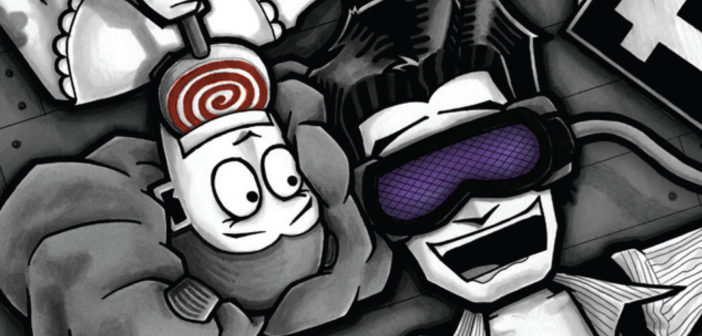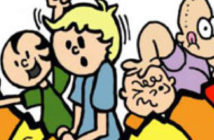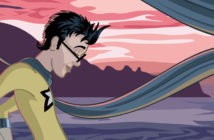What a mind Eric Adams has. He’s created an independent miniseries with a visual style morbid enough to make Tim Burton swoon, all the while telling a story that even now, after carefully reading, I have a hard time putting into words. I speak of Lackluster World, a book I discovered while touring the lonely aisles of the “Small Publishing” section of the 2010 New York Comic Con.
As anyone who appreciates comics would be, I felt an instant magnetic pull when seeing the sample pages of Lackluster World that Adams had on display. His angular cartoon characters stare up and out of the page with wide, lunar eyes. But don’t be mistaken: those eyes don’t feign optimism or naiveté. The characters in Lackluster World are battling against the comic’s namesake: the monotony of the everyday, lackluster world. This may sound like a high-class problem, but sometimes the issues we face in life are relative and not universal. With this in mind, what exactly do we do when the world around us stagnates, becomes complacent, and no longer has any thrills or pleasures? Whose fault is it? Is there anything to be done?
Ask Fahrenheit Monahan, a sullen albino whose only pleasure is writing, and yet, he doesn’t care for his job at the Paper located in the City, which he has called home ever since his family moved there when he was a kid. Fahrenheit always has a frown on his face, and who can blame him? While I’m sure Adams’s choice to leave his comic in black and white was both a consideration of finance and labor, the book shouldn’t be artistically presented any other way. As far as Fahrenheit is concerned, the lackluster world around him is a necropolis and everyone in it is dead—they just don’t know it. Now what good would color do in a scenario such as that? Yes, black and white it is.
I’m not sure what annoys Fahrenheit more: the fact that everyone and everything around him is as boring as a corpse, or that he’s the only one who realizes it. To say that Fahrenheit is irritated with all of the apathy and monotony around him is putting it lightly—too lightly. But he’s going to wake everyone up. So, one night, Fahrenheit paints 120 body outlines in the center of the City as if a mass murder silently took place in the darkness. Along with the outlines is a message that reads: “You are already dead.”
The entire City is caught up in the vandalism, including Fahrenheit’s brother, Kelvin, a Jesus freak who lost his mind years ago, and his sister, Celsius, who simply lost her mind—if she ever had one to begin with. Kelvin has his suspicions that Fahrenheit is behind the vandalism, and his solution? Convert Fahrenheit to Christianity, of course. And he’s willing to go to any measure in order to do so, including drugging and brainwashing his younger brother if need be.
As for the rest of the city, it splits in half: one side views Fahrenheit’s anonymous vandalism as an inspirational message; t-shirts are even printed with the phrase: “Where were you the day you died?” The other half views the vandalism as devilish anarchy that must be squashed at any cost. This is compacted when the ridiculously large crucifix of the City’s premiere mega church is vandalized next.
Among the supporters is Herman “Cog” Cogswell, who starts out as the obnoxious coworker who Fahrenheit can’t stomach. He’s a typical frat boy who resents being forced to conform to the “real world.” But he and Fahrenheit begin to form a bond as the city-wide vandalisms escalate, and Cog begins to realize that his own lackluster world will not change unless he steps up to change it himself.
“Unique” is a cheap word, but I’ll use it anyway. Adams’s Lackluster World is very much a unique book. It’s a story filled with misanthropes, wackos, and weak-minded fools. Sure, it’s all over the top and a little self-indulgent of Fahrenheit’s pessimism at times, but more than once I could see where our albino antihero was coming from all too well.
That said, Adams doesn’t leave his characters to become the victims of our assumptions. Of the six issues on the market (there is one more, the seventh, before the miniseries is finished), the fifth is the by far best because of the humanly organic trials Fahrenheit is put through by his bullying older brother Kelvin and how his childhood as an outsider shaped who he is today and why he ceaselessly tries to warn all of us that we’re trapped in apathy.
It’s individualism that Fahrenheit truly values. Conformity is the antithesis to that, but when everyone around him turns his message into a catch phrase, what’s he to do? Well, I’d be happy to offer him a few tips for getting through the day. The first is to sigh. A lot.
This comic book review originally appeared on Broken Frontier.




